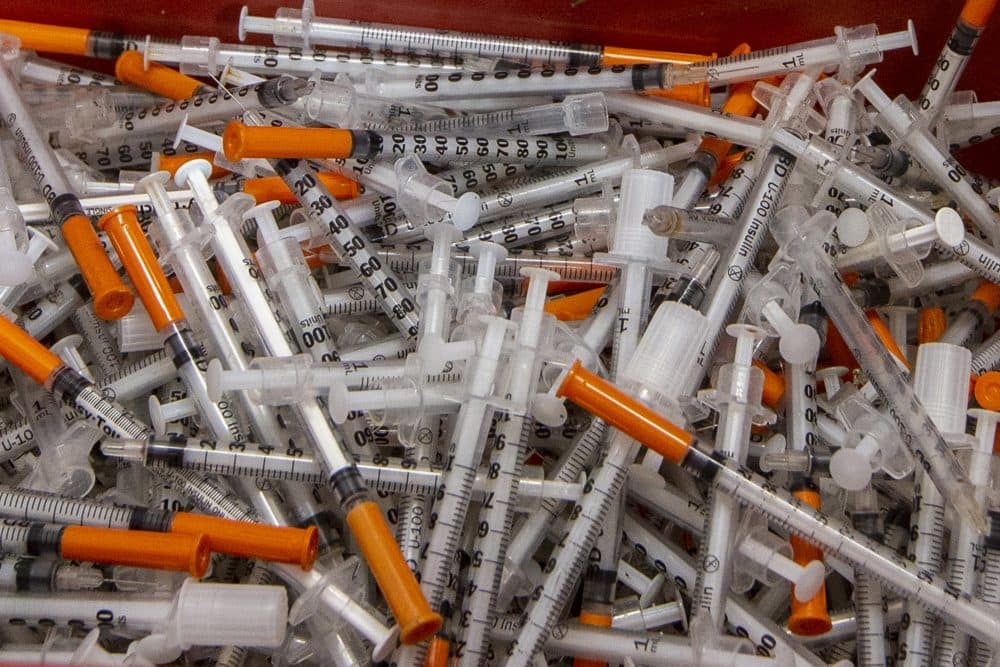Advertisement
Urgent Calls For Supervised Drug Consumption At State House Hearing

Doctors, drug users, parents who’ve lost children to an overdose and street outreach workers on Monday urged lawmakers to launch a pilot of two or more supervised drug consumption sites in Massachusetts.
Their testimony came during a five hour committee hearing on proposed legislation. The hearing is the latest attempt to move forward on a supervised consumption pilot recommended by a special commission more than two years ago.
“While we wait, my patients and friends are dying,” said Dr. Miriam Harris, an addiction medicine specialist at Boston Medical Center. “It’s time to prioritize people who use drugs.”
The most recent state numbers show overdose deaths reaching a new peak during the pandemic, especially among Black men. But Gov. Charlie Baker and other top elected leaders have said they don’t want to spend time on supervised consumption sites while their legal status is in question.
Many long time drug users and people helping with recovery say that’s the same argument used 25 years ago to prevent distribution of the overdose reversal drug naloxone and clean needles — now proven life-saving tools.
“I see safe consumption sites as a natural extension of these services and something that’s long overdue,” said Liz Whynott, director of harm reduction at Tapestry Health in Western Massachusetts.
Whynott and others spoke of people who come in to exchange needles and are found dead soon after in a nearby bathroom or alley. Some outreach workers said they are delivering needles and other supplies to people who use drugs and then waiting, in person or on the phone, to make sure their client doesn’t overdose.
“We need to meet people where they use,” said Kim Powers who runs AccessHope on Cape Cod. “In a rural area, that’s really difficult.”
Powers made the case for mobile supervised consumption programs. In Somerville, officials plan to open a site in a city-owned building, likely in Davis or Sullivan Squares. City leaders have asked for changes in some state drug and licensing laws to protect their investment in the building and its staff. It’s not clear if the Biden administration would move to block the opening, but Somerville is moving ahead.
“We are living in the worst case scenario,” said Somerville City Council President Matt McLaughlin. “It’s time for us to start acting like that and use every tool at our disposal.”
At the state house hearing, some researchers pointed to studies that show supervised consumption sites save money by reducing the need for ambulance runs, emergency room visits and hospital stays. Tearful parents spoke about children who might still be alive if they’d had a safe, judgement-free place where they could test their drugs and be revived if they overdosed.
Cara Moser’s daughter Eliza Harper died about three years ago, alone, in the family’s living room. Her brother, then 14, found her. Moser read a statement from her son.
“If Eliza had access to safe consumption sites, I would have wished her happy birthday and been saved from the trauma of finding my sister’s cold, lifeless body lying stiff on the couch,” Moser read.
Two people spoke against the idea during the hours of testimony.
Boston City Councilor Frank Baker urged lawmakers not to pursue a supervised consumption site, and not to place it in the area near Massachusetts Avenue and Melnea Cass Boulevard if they do.
“I don’t question the fact that safe injection sites save lives. Of course they do. People are shooting drugs in their system while there’s trained professionals around there,” said Baker. “But I don’t think that it — this is what we should be focused on.”
Baker said he supports a plan from Suffolk County Sheriff Steve Tompkins to move drug users off the streets and into jails for required treatment.
Supervised consumption site supporters stressed the need to keep people alive until they get into treatment and recovery.
Chris Alba, a former drug user who now works in harm reduction, said he feels traumatized by all the deaths, and that he could do more to stop them if the state amended some drug laws. Alba sees discrimination in the resistance to supervised consumption.
“If this was something other than addiction, we’d already be implementing these services,” Alba said. “It just goes to show that the stigma is still strong.”
